Search Results
Showing results 61 to 80 of 201
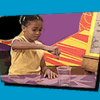
Penny Cup Game
Source Institutions
In this optics activity, learners conduct an experiment to find out why two eyes are better than one!

Build a Soundscape
Source Institutions
This is a virtual representation of a sound mixer containing pre-looped sounds of animal, insect, and environmental noises.

Aesop's Arithmetic
Source Institutions
In this activity (located on page 9 of the PDF), learners are introduced to Aesop's fable, "The Crow and the Pitcher." In the story, a clever crow drops pebbles into a pitcher to cause the water level
Is It Possible: Estimating Measurement
Source Institutions
In this activity, learners will decide together on a question about how far, long or high the group could reach together.
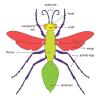
Invent an Insect
Source Institutions
In this creative activity, learners will find out what makes an insect an insect by studying examples of insect adaptations and by examining why there are so many different types of insects.

Don't Be Nerve-ous
Source Institutions
In this activity, learners discover a brain process called habituation.
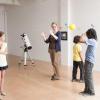
Exploring the Solar System: Big Sun, Small Moon
Source Institutions
“Exploring the Solar System: Big Sun, Small Moon” is a hands-on activity that explores the concept of apparent size and allows visitors to experience this phenomena using familiar objects—a tennis bal
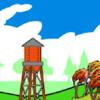
The Great Balloon Race
Source Institutions
In this online Flash game, learners take to the skies in a hot air balloon and are challenged to beat other balloonists' times to the finish line without crashing.
Composting: A Scientific Investigation
Source Institutions
In this activity, learners conduct a scientific investigation involving decomposition and discover that the life cycle of trash is affected by its organic or inorganic nature.

Proprioception: Wiggle where you're at
Source Institutions
We're told from a young age that we have 5 senses, but we have many more. One of which is our awareness of our own body part's orientation and position.

A Pressing Engagement
Source Institutions
In this quick and easy activity and/or demonstration, learners illustrate the effect of the weight of air over our heads.

Hieroglyph Holiday
Source Institutions
In this activity about archaeology, learners will explore different Egyptian hieroglyphs and recognize their meanings and uses.
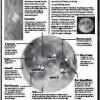
Observing the Moon
Source Institutions
Use this Moon Map Guide to help learners identify features on the Moon, while looking through a telescope.
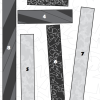
Paper Puzzle
Source Institutions
In this math activity, challenge learners to make two equal rows from eight different paper strips. Learners can explore the many ways they can solve this problem.
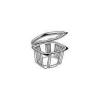
Shrinkers: Cook up some plastic!
Source Institutions
In this activity (on page 2 of the PDF), learners (with adult help and supervision) investigate how heat affects polystyrene plastic.

Go Bug!
Source Institutions
By playing a card game similar to "Go Fish," but based on the stages of metamorphosis, learners will be able to see how insects change in form as they grow and will consider the advantages of undergoi

Tower of Coins
Source Institutions
In this physics activity, challenge learners to remove the bottom coin of a stack of nickels without knocking over the stack. Use this activity to demonstrate friction.

Baffling Body
Source Institutions
In this activity, learners will learn about proprioception, or the body's sense of its place and position in space.
Size Them Up: Learning About Volume and Capacity
Source Institutions
In this activity, learners will put a set of containers in order by capacity. Would the tallest container hold more or less water than the wide, short one?
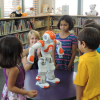
Circuits with Friends
Source Institutions
In this activity, learners explore the parts of a circuit by modeling, as a group, a “human” circuit.
